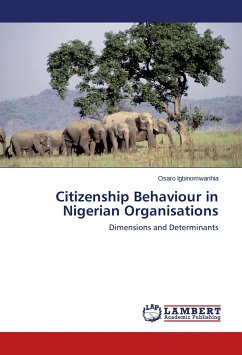This study examines the impact of individual characteristics and cultural values on citizenship performance (CP) in the context of a developing country. Previous studies indicate that many studies have been carried out by selecting only two or three cultural variables and the situation in developing countries is often not clear. The study found that gender and education have significant impact on citizenship performance (CP). While collectivism, future orientation, and uncertainty avoidance are found to be positively related to CP, power distance and masculinity values are negatively correlated with CP. It is also evident that the same cultural value orientation can have both positive and negative impacts on CP, depending on the particular aspect of CP. The findings also reveal that developing countries are not totally different from developed countries as far as the impact of cultural values on CP is concerned. The study contributes to the advancement of CP theories of individual differences and cultural values and the knowledge relevant to developing countries.
Bitte wählen Sie Ihr Anliegen aus.
Rechnungen
Retourenschein anfordern
Bestellstatus
Storno








